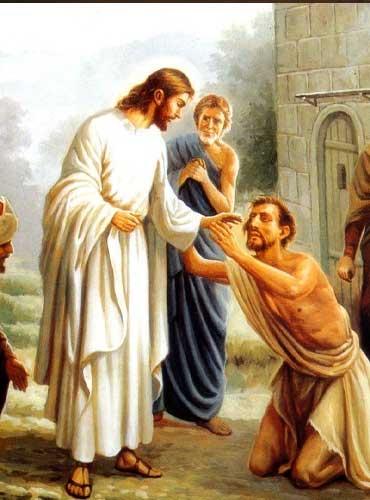Thursday of the First Week of Ordinary Time – Mk 1:40-45
Today’s Gospel presents us with a leper who throws himself before Jesus. His words, “If you wish, you can make me clean,” are a testament to his faith, since even though God worked many miracles in the Old Testament, there are only two healings of lepers recorded: Miriam, Moses’ sister, and Naaman the Syrian. The great Saint Ambrose seems to say that this leper in some way represents all of us, who are sick with our sins, and this for two reasons: first, because the Gospel doesn’t give a specific place for the healing: “Rightly no definite place is mentioned where the leprous man was healed, to signify that not one people of any particular city, but all nations, were healed.” Secondly, the man’s actions can apply to us all: “In kneeling down he marked his humility and modesty, for everyone should blush at the stains of his life, but his reverence kept not back his confession: he shows his wound, and asks for a remedy.” The Gospel gives us reason for hope; the leper who approached Jesus clearly recognized that he was beyond the help of medicine. He recognized his sorry state, and went to Christ. Jesus’ great power is revealed in the fact that the leper wasn’t just at any stage of his disease; the parallel text in Luke tells us that he was “full of leprosy,” at the end of his disease, meaning, he would have been in terrible shape. Yet Jesus, with only a touch, completely heals him.
Today, Jesus’ healing power is most often revealed in the sacrament of confession. There Jesus’ power over sin is clearly revealed. As Pope Francis wrote, it is confession that “enables people to touch the grandeur of God’s mercy with their own hands.” We can ask ourselves how we approach the sacrament of confession: is it like the leper, who threw himself at Jesus’ feet? Or do we try to hide ourselves from Christ, or, rather, as Saint Augustine says, “we don’t really hide ourselves from Jesus; we hide Jesus from ourselves.” For Confession to really do us good and heal us, we need humility. As Jesus told Saint Faustina, “A soul does not benefit as it should from the sacrament of confession if it is not humble. Pride keeps it in darkness. The soul neither knows how, nor is it willing, to probe with precision the depths of its own misery. It puts on a mask and avoids everything that might bring it recovery.” Humility allows us to kneel before Jesus, and to beg Him to heal us as only He can.
Today then, as we begin our journey through ordinary time, let us pray, through the intercession of Mary, Mother of Mercy, for the grace to always humbly approach the sacrament of confession with willing and joyful hearts, knowing that Christ wills to cleanse us in it, provided we open our hearts to Him.






